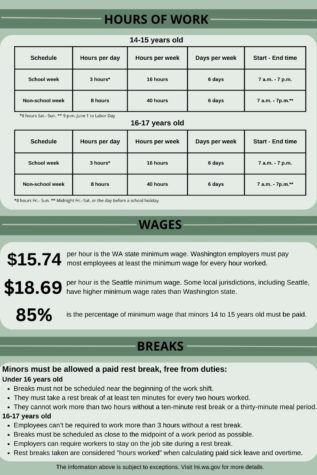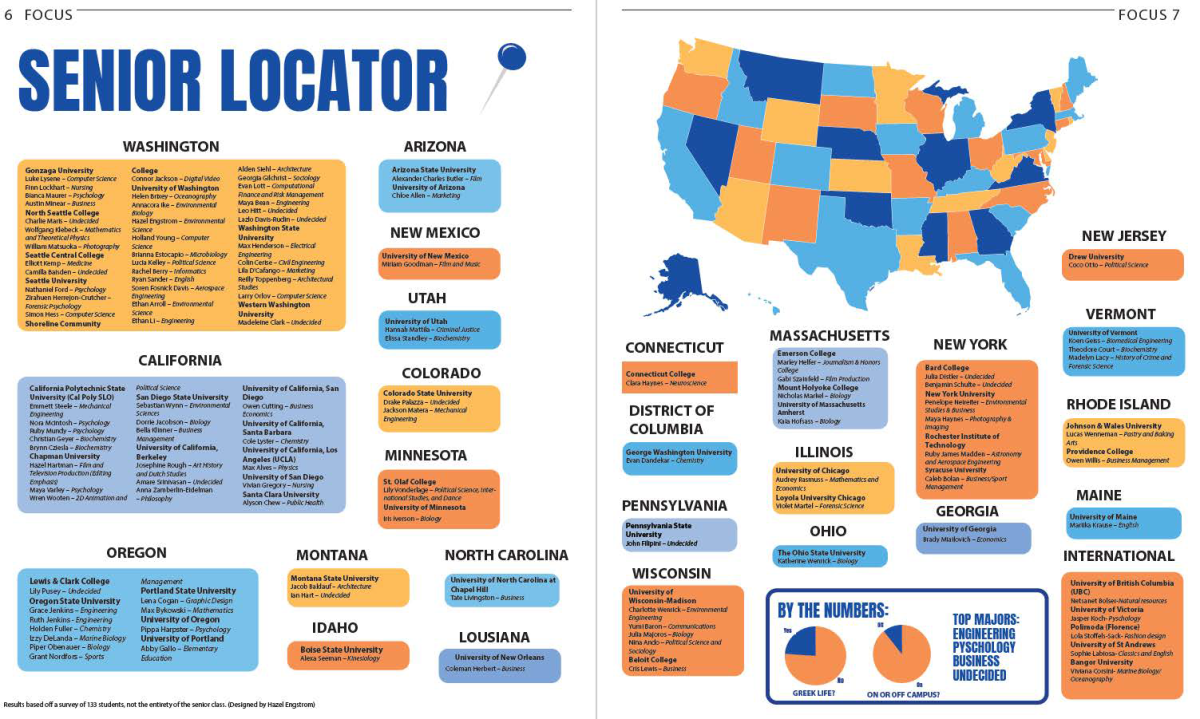Local employers allow students to work schedules that violate youth employment regulations
Working Overtime: Student Labor Laws
Though some students are unaware of student labor laws, many also avoid speaking out because they are willing and eager to work additional hours. Several students described that they would rather simply get paid for extra time than address the violations.
February 9, 2023
Whether students work to save up for college, to help support their families or simply to pay for Winter Ball tickets, many have part-time jobs during the school year. Often, these jobs take up significant time, as students work to fit their schedules around extracurriculars, homework and other responsibilities. Counselor Gail Olson Lang described these jobs, explaining several common options.
“[Student jobs] hugely vary,” Olson said. “I find that usually [student jobs] fall into quick-serve restaurants, childcare or customer service.”
For many students, these jobs provide their first paychecks and first experiences as employees. Students are happy to spend time waiting tables or bagging groceries after school for a regular income and an added line on their resume.
Not all student jobs are created equally, though. Depending on their employers, some students have found themselves scheduled to work long hours each week.

In some cases, these schedules violate Washington labor laws, encroaching on minor employee protections. As described in the chart to the left, there are strict state working hour limits for minor laborers, which vary based on age. Though many employers adhere to these restrictions, several local employers do not.
For instance, one senior who requested to remain anonymous was regularly asked by his former employer to work hours that exceeded the limits for 17 year olds.
“Originally our shifts were 4 hours [on weekdays],” he said. “But [then they] got extended to …4 ½ hours. Plus also, if there’s anything to clean up we’d have to stay after.”
Adding on, he mentioned that his working schedule was often not limited to after school hours.
“I worked lunches. There weren’t scheduled hours, it was just that one day my boss [asked], ‘Hey, would you work during lunch?’ And so every Wednesday I’d just go in there, clock in, and start taking people’s orders.”
In these cases, both working over four hours on school nights and working during school hours would be prohibited. This student believed the violations were not due to a lack of employer knowledge about labor regulations, though.
“I was given [a sheet] showing the amount of hours you can work and the ages, so [my employer] was pretty knowledgeable about [labor laws],” he said.
Other students have also faced working hour violations, like a 15-year-old freshman who also requested to remain anonymous.
“[On weekends] I work [the] dinner shift, so I go in at either 3:30 … or 5:30, [and] I’ll go until 10:00 or 11:00,” he said.
These hours significantly exceed the limit on shifts for 15 year olds, which should end before 7 p.m. This student also works 4 ½ hour shifts on weekdays, which violate child labor laws as well.
In addition to these limits, employers in Washington are also required to have all employees under the age of 18 complete a Parent/School Authorization Form. The purpose of this form is to ensure that employed students are maintaining their grades and prioritizing school.

“When students get a job, they have to bring us a Washington state [Parent/School Authorization] form that [their counselors] have to sign … and the school has to give authority for that student to have a job,” Olson said.
Despite this form, some students have found themselves working past legal hours and not receiving their required break time. If students feel uncomfortable with bringing these issues to their employer directly, counselors can advocate for them by reaching out to the business.
“We can take the pressure off students from having those difficult conversations by saying the school doesn’t allow [students to work that much],” Olson said.
Students can also file complaints themselves through the Department of Labor and Industries, which will investigate reports of law violations. Danielle Franco-Malone, a partner of the Barnard Iglitzin & Lavitt LLP worker law firm, explained this process.
“It’s super easy to go online and file a complaint … that child labor laws were violated,” Franco-Malone said. “… any person [can] file a complaint that the Department will then investigate through an administrative process and take appropriate administrative enforcement actions … They potentially can issue fines against employers who violate those restrictions.”
When responding to labor law violations, students are also protected by law from being fired or otherwise reprimanded for speaking out, even if they are not part of a union.
“When employees are banding together to advocate for their working conditions, that is something that the employer under federal law is prohibited from retaliating against,” Franco-Malone said. “Even if it’s just one worker standing up and trying to do something about working conditions that affect both themselves and their co-workers, that triggers protections … under the National Labor Relations Act.”
Though some students are unaware of these options, many also avoid speaking out because they are willing and eager to work additional hours. The 17-year-old student who was quoted earlier described that he would rather simply get paid for the extra time than address the violations. The other anonymous student was also willing to work over the legal limits.
“I don’t have a big problem with [working extra hours]. It’s not like anything that’s negatively affecting me and it’s a good job,” the 15-year-old student said.
Other students that work legal hours even expressed jealousy for those who don’t, wishing they could work later and longer to earn more money. One student even stated that they “hate” child labor laws. However, according to Olson, employee willingness to work longer hours does not make it ethical for businesses to break student labor laws.
“I think that businesses have a responsibility to obey the law,” Olson said. “I mean … we have [labor] laws for a reason.”
She emphasized the importance of allocating time for both school and work life, as some students struggle to fit both into their schedules.
“Outside of school [students] have to find a balance,” Olson said. “If you’re working from four to 10, when are you doing homework? When are you eating, when are you sleeping?” Olson said.
While many students have jobs for a variety of reasons, some need to work to support their families.
“Some students genuinely have to work. Rent is high in this area, everything costs a lot of money,” Olson said. “So for them, I understand that they’re contributing to their families and budgets.”
In cases such as these, employers can be given special permission for students to work outside of the typical legal hours.
“I have signed variances when students have part-time jobs that they need to make ends meet,” Olson said.
Franco-Malone also described the variance system, which provides a legal pathway towards longer minor working hours.
“There is a lawful way for employers to [allow students to work additional hours] … An employer has to jump through the right hoops in order to receive a variance, but the law does allow them to get one,” Franco-Malone said.
Along with variances, there are also a number of nuanced exceptions to the hour limits, but most student jobs do not fall into these categories and are subject to the default Washington Labor laws. To learn more about these workers rights, students can visit the Washington State Department of Labor and Industries website.

























